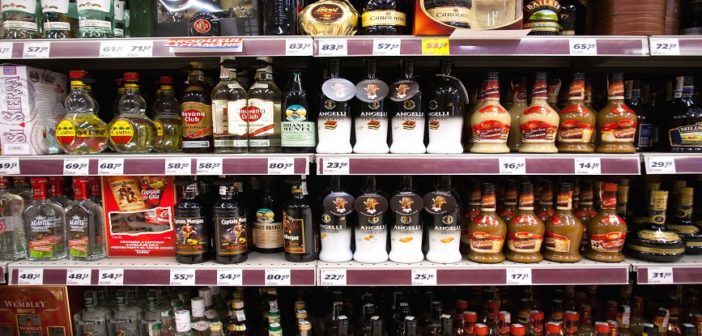If prohibition taught us anything other than how sexy women look with bob cuts, it’s that people will do whatever it takes to get drunk. Even if that means drinking it out of a bathtub. And if a St. Patrick’s Day celebration gone awry days before the actual “holiday” is any indication (and it is), nothing at all has changed.
Even If You Don’t Build It, They Will Come
Which is why the NHS report of a recent study done on buying patterns at an English supermarket seems like an odd utilization of resources. Researchers say that their data shows that products placed at the end of aisles had a boost in sales. But isn’t it kind of cheating to use alcohol and non-alcoholic mixers as test bodies for this theory? While I might be more apt to buy mascara I don’t need if it’s strategically placed, life is a whole lot simpler when it comes to booze. For instance: If I want tequila, I will find tequila. Even if I have to ask a clerk where it is, even if I have to ask them if they have any more in back, even if I have to go through a series of secret passageways, decode a treasure map and talk to a wizard. Alcohol doesn’t need to be placed anywhere special to be found.
The researchers have now introduced the idea that perhaps the government should regulate the display of “high-risk” goods the way they do with tobacco in order to encourage people to be healthier. I say that if you want to encourage people to be healthier, stock the liquor in the produce section.
Most People Get It
This reminded me of the recent news about a federal court decision not to extend the alcoholic beverage makers’ obligation to warn consumers of the supposed risk of alcohol addiction—an action that had been filed by inmates who were seeking to hold alcohol beverage makers liable for not warning people that consuming alcohol could be habit forming or addictive.
While I can’t speak for the drug and alcohol education available to all children or for the messages kids get about substance abuse from their environment, I think it’s safe to assume that the majority of people who are sophomorically experimenting with alcohol are aware of what an alcoholic is—or at least their idea of what an alcoholic is—and they understand that one way alcoholics are created is by consuming alcohol.
Labels Don’t Cure Alcoholism
Still though, some of the plaintiffs’ in the Idaho case felt strongly that if they could be catapulted back in time to their youth, they were certain that they never would have picked up a drink had there been a warning on the label that even “reasonable drinking” could lead to alcohol addiction “due to the possibility of a predisposition” to the disease.
One of the problems with this argument is that alcoholism doesn’t only affect people who are genetically pre-disposed to the disease—that is, people who have alcoholics in their family. Another problem is that if you are pre-disposed to the disease and have alcoholics in your family, more than likely you already know that. And yet another problem is one that can perhaps be summarized like this: I drank Jack Daniels religiously for 13 years and couldn’t tell you one thing printed on the label.
The groups lobbying for free market interference on products that are potentially harmful to people’s health and well-being isn’t just embarrassing but it’s exactly the reason why we have the problem they feel is worth lobbying to eradicate. It’s time we stop teaching our younger generations that it’s always someone else’s fault when there’s a problem. If there is any outside responsibility at all here, it doesn’t belong to the alcohol companies; it’s on us.
Sponsored DISCLAIMER: This is a paid advertisement for California Behavioral Health, LLC, a CA licensed substance abuse treatment provider and not a service provided by The Fix. Calls to this number are answered by CBH, free and without obligation to the consumer. No one who answers the call receives a fee based upon the consumer’s choice to enter treatment. For additional info on other treatment providers and options visit www.samhsa.gov.





